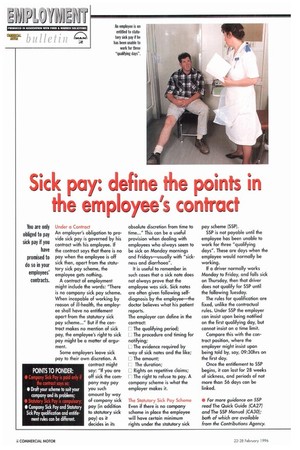Sick pay: define ti3 points in the employee's mond
Page 52

If you've noticed an error in this article please click here to report it so we can fix it.
Under a Contract
An employer's obligation to provide sick pay is governed by his contract with his employee. If the contract says that there is no pay when the employee is off sick then, apart from the statutory sick pay scheme, the employee gets nothing.
A contract of employment might include the words: "There is no company sick pay scheme. When incapable of working by reason of ill-health, the employee shall have no entitlement apart from the statutory sick pay scheme..." But if the contract makes no mention of sick pay, the employee's right to sick pay might be a matter of argument.
Some employers leave sick pay to their own discretion. A contract might say: "If you are off sick the company may pay you such amount by way of company sick pay (in addition to statutory sick pay) as it decides in its absolute discretion from time to time..." This can be a useful provision when dealing with employees who always seem to be sick on Monday mornings and Fridays—usually with "sickness and diarrhoea".
It is useful to remember in such cases that a sick note does not always prove that the employee was sick. Sick notes are often given following selfdiagnosis by the employee—the doctor believes what his patient reports.
The employer can define in the contract: The qualifying period; The procedure and timing for notifying; The evidence required by way of sick notes and the like; The amount; The duration; E Rights on repetitive claims; The right to refuse to pay. A company scheme is what the employer makes it.
The Statutory Sick Pay Scheme Even if there is no company scheme in place the employee will have certain minimum rights under the statutory sick pay scheme (SSP).
SSP is not payable until the employee has been unable to work for three "qualifying days". These are days when the employee would normally be working.
If a driver normally works Monday to Friday, and falls sick on Thursday, then that driver does not qualify for SSP until the following Tuesday.
The rules for qualification are fixed, unlike the contractual rules. Under SSP the employer can insist upon being notified on the first qualifying day, but cannot insist on a time limit.
Compare this with the contract position, where the employer might insist upon being told by, say, 09:30hrs on the first day.
Once the entitlement to SSP begins, it can last for 28 weeks of sickness, and periods of not more than 56 days can be linked.
For more guidance on SSP read The Quick Guide (CA27) and The SSP Manual (CA30; both of which are available from the Contributions Agency.




































































































